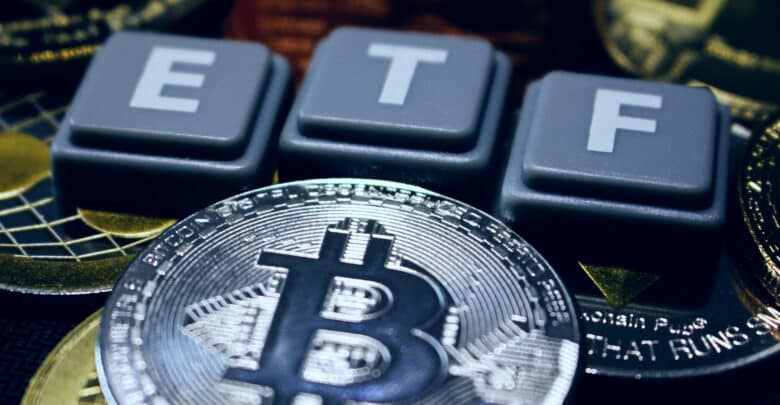A Comprehensive Guide to Bitcoin Futures ETFs

An exchange-traded fund (ETF) focusing on bitcoin futures allows investors to participate in the performance of bitcoin futures contracts, bypassing the necessity of owning the digital currency directly.
A futures contract is a legally binding agreement that compels the purchaser to buy or the seller to sell a specific asset (in this context, bitcoin) at a pre-agreed price and time in the future.
What is the Mechanism Behind a Bitcoin Futures ETF?
The fundamental aim of a bitcoin futures ETF is to mirror the fluctuations of the underlying bitcoin futures contracts. This is achieved when an investment firm establishes a subsidiary that functions as a commodity pool in compliance with the Commodity Futures Trading Commission (CFTC) regulations. This pool engages in trading futures contracts to closely replicate the actual value of Bitcoin.
Nevertheless, it’s important to note that futures contracts have expiry dates. The ETF may occasionally adjust its futures contracts to sustain continuous exposure. This ‘rolling’ involves selling contracts close to expiring and purchasing those with more distant expiry dates. The rolling process can affect the fund’s performance, particularly during periods of contango (when the futures contract prices are higher than spot prices) or backwardation (when futures prices fall below spot prices).
Like other ETFs, those based on bitcoin futures also levy management fees to manage operational and administrative costs. Investors should know these fees and their potential impact on total returns.
Bitcoin futures ETFs fall under regulatory scrutiny. Regulatory agencies, such as the Securities and Exchange Commission in the United States, must review and sanction these financial instruments before they become available to investors. Currently, there are several bitcoin futures ETFs available in the U.S.
Why Might Investors Opt for a Bitcoin Futures ETF?
Investors might be drawn to a bitcoin futures ETF for various reasons, depending on their investment goals, risk appetite, and market perspective. Here are some reasons why a bitcoin futures ETF might be appealing:
- Indirect bitcoin exposure: Investors keen on tracking bitcoin price movements without directly holding the cryptocurrency might opt for a bitcoin futures ETF. This choice enables participation in the Bitcoin market’s potential ups and downs without needing a cryptocurrency wallet or managing the intricacies of possessing actual Bitcoin.
- Risk mitigation: Bitcoin futures ETFs can serve as a hedge in an investment portfolio. These ETFs counterbalance potential losses in other investments, providing a cushion against risks typically associated with traditional assets like stocks and bonds.
- Leverage: Certain bitcoin futures ETFs employ leverage to intensify returns. Investors comfortable with higher risks and confident in Bitcoin’s price trends might select leveraged ETFs for potentially greater returns. It’s vital, however, to recognize that leverage also escalates risk levels.
- Ease and reach: ETFs, including those centered on bitcoin futures, are traded on standard stock exchanges, thus widely accessible to various investors. This ease of access allows investors to buy and sell ETF shares at prevailing market prices during trading hours, offering liquidity and flexibility.
- Regulatory compliance: Bitcoin futures ETFs are subject to strict regulatory standards and approvals by financial authorities. Some investors prefer this regulated environment over direct investments in cryptocurrency exchanges, which may still be navigating regulatory uncertainties.
- Portfolio diversification: To spread investment risks and potentially reduce overall portfolio volatility, investors might consider bitcoin futures ETFs to diversify, adding a different asset class to their portfolios.
- Speculative trading: Based on their market analyses, short-term traders looking to capitalize on cryptocurrency market fluctuations might use bitcoin futures ETFs to speculate on bitcoin’s price changes, whether bullish or bearish.
How does a spot bitcoin ETF differ from a bitcoin futures ETF?
A spot bitcoin ETF distinguishes itself by directly investing in actual bitcoin, aligning its performance closely with the cryptocurrency’s price fluctuations. This contrasts with a futures-based product.
Consequently, those who invest in a spot bitcoin ETF are subject to the direct volatility of the spot market. Gains may occur if Bitcoin’s price rises, while a price decline can lead to potential losses.
Spot ETFs typically avoid leverage and do not engage in rolling contracts. This is due to their holding of physical Bitcoin, which is not subject to expiration dates like spot holdings.
What are the potential risks associated with a bitcoin futures ETF?
The valuation of a bitcoin futures ETF is contingent on the price dynamics of the bitcoin futures market. This can be influenced by market conditions like contango or backwardation, affecting the ETF’s returns. Additionally, rolling over futures contracts to bypass expiration may incur trading expenses.
Certain bitcoin futures ETFs implement leverage to boost potential returns. Although this can augment profits, it escalates risk levels, potentially leading to amplified losses due to increased volatility.
Bitcoin futures contracts are executed on futures exchanges, introducing counterparty risk. This risk arises from the possibility of a counterparty defaulting on its obligations, which could adversely affect the ETF’s performance.
The regulatory framework surrounding Bitcoin and its financial derivatives is in flux. Any alterations in regulations or legal challenges could influence the functioning and asset value of a bitcoin futures ETF.
Acknowledging that the regulatory environment and availability of bitcoin futures ETFs might vary across different regions is crucial. Investors must thoroughly examine the ETF’s prospectus and risk factors, considering elements like regulatory compliance, fees, and the fund’s investment approach.
Editorial credit: Beneath Blue / Shutterstock.com
Tokenhell produces content exposure for over 5,000 crypto companies and you can be one of them too! Contact at [email protected] if you have any questions. Cryptocurrencies are highly volatile, conduct your own research before making any investment decisions. Some of the posts on this website are guest posts or paid posts that are not written by Tokenhell authors (namely Crypto Cable , Sponsored Articles and Press Release content) and the views expressed in these types of posts do not reflect the views of this website. CreditInsightHubs is not responsible for the content, accuracy, quality, advertising, products or any other content or banners (ad space) posted on the site. Read full terms and conditions / disclaimer.





